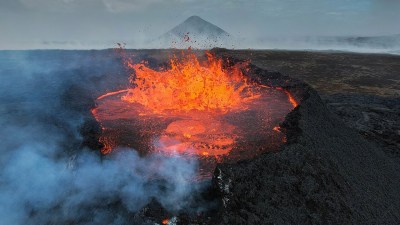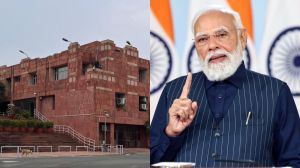Day One: Well begun, all say a lot to be done
Hardly had the opening session of the friendliest SAARC summit in years ended at the resplendent Jinnah Convention Centre here this afternoo...

Hardly had the opening session of the friendliest SAARC summit in years ended at the resplendent Jinnah Convention Centre here this afternoon8212;with never a mention of the 8216;K8217; word nor of the 8216;8216;cross-border terrorism8217;8217; phrase that Islamabad loves to hate8212;when Prime Minister Atal Behari Vajpayee went into a scheduled half-hour meeting with Pakistan Prime Minister Mir Zafarullah Khan Jamali.
The announcement about the meeting between the two Prime Ministers was followed by another that threatened to marginalise the SAARC juggernaut. India had asked for a 8216;8216;courtesy call8217;8217; on President Pervez Musharraf8212;which the host later said would 8216;8216;take place some time tomorrow.8217;8217;
Ending the suspense of the last week over meetings between Vajpayee and the Pakistani leadership, External Affairs Minister Yashwant Sinha said the two Prime Ministers had 8216;8216;agreed that the momentum created in bilateral relations could be maintained.8217;8217;
Sinha also invoked New Delhi8217;s old familiarity with diplomatic jargon. Today8217;s meeting between Vajpayee and Jamali was simply a 8216;8216;courtesy call,8217;8217; never mind that it was 30 minutes long, half of which only between the two leaders. Tomorrow8217;s meeting with Musharraf was also going to be a 8216;8216;courtesy call.8217;8217;
Meanwhile, he had also paid a 8216;8216;courtesy visit8217;8217; on Pakistan foreign minister Khurshid Kasuri this afternoon, on the fourth day of his arrival from Delhi, to compliment him on the wonderful way he had conducted the SAARC ministerial over the last couple of days.
Sinha refused to part with any other details on the call by Vajpayee on Jamali, including on the possibility of restarting a formal dialogue with Islamabad, only pointing out that the two PMs discussed the 8216;8216;various ways of maintaining the momentum and agreed on the need to do so.8217;8217;
But with the Pakistani papers here alluding to the meeting between Principal Secretary Brajesh Mishra and President Musharraf over the last couple of days8212;before or after his trip to the ancient Buddhist site of Taxila8212; speculation was rife in Islamabad over a possible deal in which the two sides would simultaneously look at permanently ending cross-border terrorism as well as promise the beginning of a structured composite dialogue.
Sources pointed to the meeting between Mishra and Deputy PM L K Advani on December 31 in Delhi, on the eve of his departure for Islamabad on board the special flight of Yashwant Sinha. Moreover, New Delhi is also believed to 8216;8216;fully understand8217;8217; the fears within the Pakistani establishment, especially after the Christmas Day attack on Musharraf, on the terrorism that8217;s coming home to roost in the heart of Islamabad.
Under the circumstances, the Prime Minister8217;s refusal to invoke New Delhi8217;s favourite 8216;8216;cross-border terrorism8217;8217; phrase during his SAARC summit speech this morning, becomes significant.
Not only did Jamali refuse to look in the direction of naming Kashmir as the 8216;8216;core8217;8217; issue with India, he profusely complimented him at every opportunity.
8216;8216;Prime Minister Vajpayee is a visionary, a poet, a prolific writer and an able politician. All of which are qualities of a true leader,8217;8217; Jamali said. Other delegates from the smaller SAARC nations rubbed their eyes in wonderment.
In his speech, Vajpayee did, however, refer to the 8216;8216;mutual suspicions and petty rivalries that have continued to haunt us. As a result, the peace dividend has bypassed our region,8217;8217; he said.
Offering to put in 100 million into a regional poverty alleviation fund, on the condition that the money be used within the region but outside India, the PM pointed out that India could do much to support countries falling behind in the region. SAARC must get rid of its 8216;8216;complex and troubled colonial legacy8217;8217; which has prevented mutual trust and confidence, he said.
8216;8216;History can remind us, guide us, teach us or warn us. It should not shackle us. We have to look forward now, with a collective approach in mind,8217;8217; Vajpayee said.
He seemed to be replying to the crises of compromise playing upon Jamali8217;s mind as he had spoken only an hour before.
8216;8216;It is the stark reality of political differences and disputes that has held back prospects of real economic cooperation in South Asia,8217;8217; Jamali said.
In fact, he pointed out, 8216;8216;greater economic integration is inextricably linked to the creation of requisite political climate of peace and stability.8217;8217;
- 01
- 02
- 03
- 04
- 05































